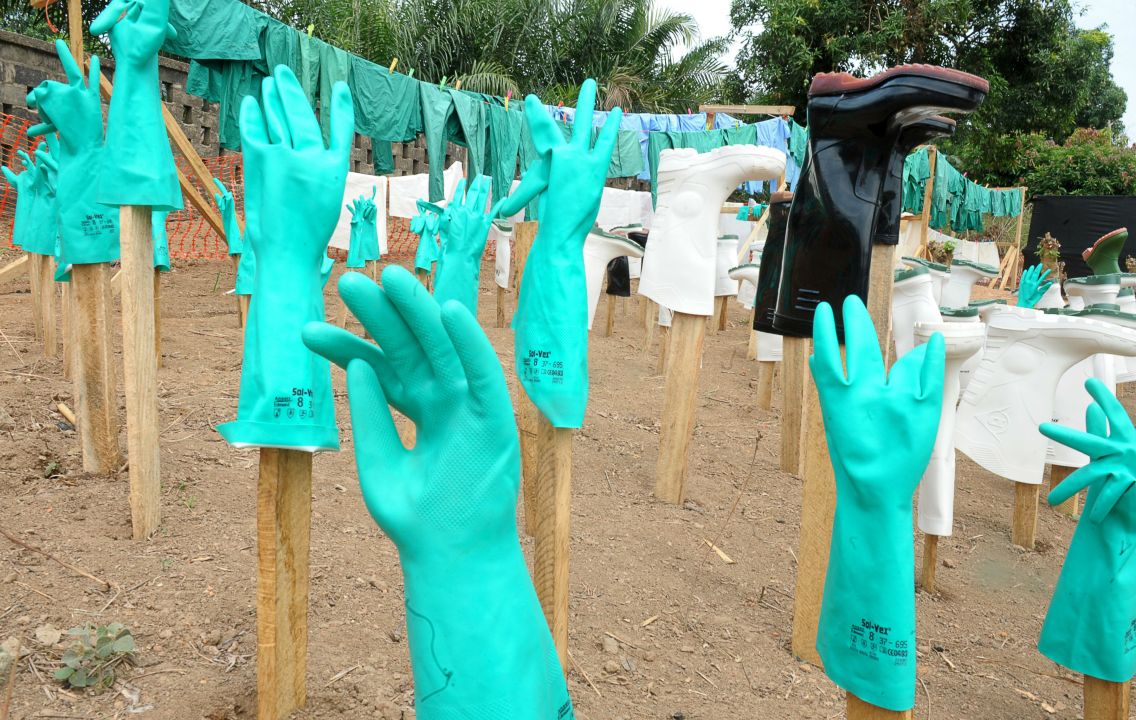Ebola clinics in many parts of West Africa are full, so more and more people are being told to stay at home and take Paracetamol and fluids if they become infected. It means if someone in your family gets Ebola, you all have to stay in the house, which is effectively a death sentence.
At the moment, the disease is killing 70 per cent of the people it infects, but that’s likely to go up. People who need other medical treatment can’t get it, and in Sierra Leone 40 per cent of farmland has been abandoned. Western governments are building secure military encampments for health workers, fearing civil unrest and angry mobs.
In 1898, there were plague riots in India after authorities brought in sanitary measures, including quarantine camps. The Spectator at the time reported:
A crowd composed of both Hindoos and Mussulmans endeavoured to rescue some prisoners sentenced at Seringapatam for breaking the rules, and, being defeated, called in ten thousand men from the surrounding villages, and made a desperate attack upon the fort… Many even swam the river, and the police and a small body of cavalry were compelled to fire, killing many, though the number is not stated… The people of Mysore think the precautions ordered by science far more dreadful than the Plague. Killing them for that erroneous opinion may be morally justifiable, though we doubt it; but is clearly unwise.
A few years earlier in Egypt, the government had taken a more hardline approach.
There is no brutality like that of the panic-struck. The deaths at Damietta from cholera exceed one hundred a day, though the population is only 30,000. A cordon of troops has been accordingly drawn round the wretched town, with orders to shoot anyone found leaving it. Consequently, everyone is afraid to enter the place, which has become a fetid prison, and there are neither sufficient doctors, guardians of order, nor medical comforts. The people die or live uncared for, relatives are divided, business is stopped, and for all anyone knows the inhabitant, may be starving. At the same time, anyone who can bribe the police gets through, so that if cholera were contagious, it would be conveyed in spite of the cruel restrictions.
In contrast, the attitude at London’s Small Pox Hospital in the 1870s was perhaps a little too relaxed.
The Small Pox Hospital does not seem to be too careful about its patients. A little girl, Elizabeth Bellue, admitted to the hospital in May last, and removed on the 24th May to the convalescent branch, has, by the admission of the hospital authorities themselves, disappeared they know not how,—they can only conjecture that the door was open, and that she went out of it. At first the hospital authorities tried to persuade the child’s father that another little girl,—who did not recognize him and was not recognized by him,—was his daughter ; but they had afterwards to admit that she was furnished with parents who did recognize her, elsewhere…The attempt to foist off another child upon the father appears to imply a general haphazardness of view with regard to the children, who are not even allowed to “sort themselves,” but sorted tentatively and erroneously by the presiding authorities. It is a very serious thing to break down the confidence of the public in the care taken by the managers of these great hospitals for infectious disease,—for this confidence is almost our only hope of stopping the spread of epidemics in the poorest and most thickly-populated parts of our great cities.
The Russian government seemed to take pains to cover up a case of the plague when a man presented with symptoms in St Petersburg in 1879.
The official doctors, however, declare that he is not suffering from plague, but from a form of syphilis, in which the symptoms are of the same kind. The interest of the Russian Government in concealing any outbreak is so strong, that its denials are received with suspicion, and the report creates great anxiety in all European capitals.
You can see why they might have been a bit cagey about it from this account three years earlier:
The plague, the true plague of Constantinople and Cairo, with its swellings and its speedy death, appears to have broken out in Canton and Hong-Kong. The deaths in Canton are not recorded; but they are believed to have exceeded two thousand in a few days. . . . According to a rather excited telegram which has reached London, the deaths in Hong-Kong had on Wednesday reached 1,500, the daily rate was 100, and 100,000 Chinese— half the population—had fled. Trade was almost suspended, and there was fear of a monetary panic. The Government was destroying the crowded native quarter, and adopting the most energetic sanitary measures, perhaps a little late.
The panic brought on by the fear of infection can be nearly as dangerous as the disease, an article argued at the end of the 19th century.
What should prove another great factor in protecting animal life in epidemics is the absence of those nervous terrors which always predispose human beings to infection, and often cause death itself by the mere horror of anticipation. Fear, contrition, religious mania, despondency, grief, despair, drink, and delirium, and the break-up of the normal social order, swelled the list of human deaths in the epidemics of the Middle Ages, and some of these factors aggravate the incidence of every great plague among mankind. The mental shock transmitted by the Black Death produced nervous disorders for two centuries,—the Dancing mania from Norway to Abyssinia, convulsions, hysteria, delusions of all sorts, aggravated by famine and poverty, the direct results of the plague.
The trauma of plagues echoes down the generations, partly, according to The Spectator in 1900, because people have a horror of being killed by something alien – “people sigh to be killed in customary ways” – but when Glasgow had an attack, the population reacted with admirable composure.
The citizens of Glasgow go about their business as usual, the Council calmly debates the best sanitary measures, and the newspapers abstain from sensational statistics. That calmness, which has now become such a habit of our people that Continentals quote it as a proof of British stolidity, is of itself a great protection. Whether intense fear of a disease predisposes towards an attack of that disease may be doubtful — though we do not ourselves see why a man should not have a sort of unconscious consciousness of his own special liabilities—but it is certain that it diminishes recuperative power, that it tends to make attacks more virulent and therefore more infectious, and that it causes disregard of medical advice. Above all, it increases domestic misery by making relatives unwilling to do their duty, scattering servants, and increasing the difficulty of supplying nurses. Southerners, who feel this panic with inexplicable keenness, almost lose their natures under its influence, isolate their dearest relatives in a way which involves shocking neglect, and regard strangers suspected of infection much as they would regard invading barbarians. They would kill them if they dared. The English are happily free of this impulse, and it will help to keep them free if they will remember that one contagious epidemic is not much worse than another, that a disease is not more dangerous to the superior races because among the inferior peoples it spreads rapidly, and that in the outburst of an epidemic, as in the hour of battle, to quail internally is no protection. Resignation, the one virtue in which no Englishman believes, is in the midst of an epidemic an excellent substitute for courage.







Comments